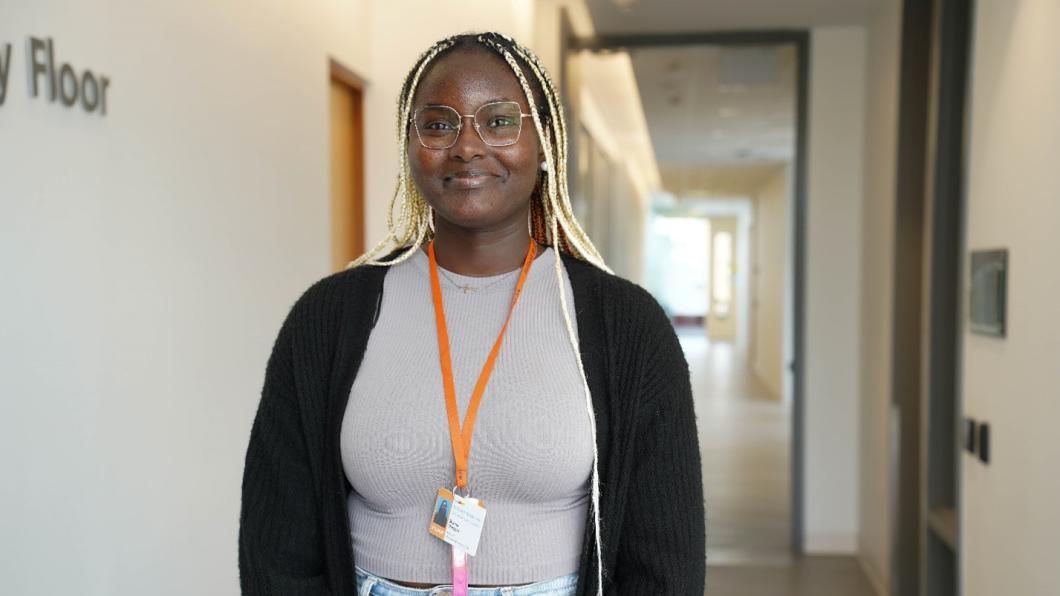
Meet Ward Summer Student: Bisola
Every summer top-students from across Canada come to the Bloorview Research Institute to participate in The Ward Family Summer Student Research Program. The prestigious internship gives students a chance to work alongside leading scientists, conduct innovative research, and engage in activities that enrich their training. Since its launch in 2006, over 180 undergraduate students have spent the summer gaining invaluable knowledge and hands-on experience.
Supported by the Ward Family Foundation, the BRI partnered the Community of Support-Research Application Support Initiative, to create the Sparking student Opportunities for Advancing inclusive childhood disability Research (SOAR) stream, which specifically offers students who have faced structural disadvantages opportunities to advance their research careers, contribute to transformative work, and receive close mentorship.
Bisola participated in the Ward Family Summer Student Program, through the SOAR stream, and took time to reflect on her experience and what she will take into the future.
What have you been working on this summer? What research will you be presenting at Ward Summer Student Day?
This summer, I have been working under Dr. Melanie Penner on the Extensive Needs Service (ENS) team. The ENS program is designed to address the unmet needs of children and youth facing developmental, mental, and social complexities. It operates as a learning health system, continuously collecting and integrating feedback to enhance its service provision. As part of this system, my research focuses on describing ENS participants to better meet individual needs and advocate for populations whose needs are not currently being met by the system. I created an abstract, poster, and poster presentation based on this research, which I will be presenting at the Ward Research Day.
Additionally, I have been involved in a qualitative study collecting insights from respite providers who work with ENS clients. The study aims to evaluate the current ENS respite program and also answer the research question: "What are the barriers and facilitators to providing effective respite care for children with complex behavioural needs?" So far, this research has been incredibly rewarding and has solidified my commitment to pursuing a career in healthcare and research, where I can continue to advocate for and support underrepresented populations.
The SOAR stream is committed to helping learners advance the field of childhood disability Research. Is this something you are hoping to pursue in your future career?
Discovering the SOAR stream through RASI-COS has been a tremendous opportunity, especially as a student struggling to find research opportunities. The research and mentorship opportunities provided by the Ward research program have been invaluable, offering profound insights into the field of pediatric disability.
Before this program, I was aware of pediatric disability research but had not been on a team conducting a study in the field. Working as a research trainee under Dr. Melanie Penner at the Autism Research Centre has been transformative! I gained a deeper understanding of knowledge gaps in pediatric disability research and have been introduced to the ongoing efforts to bridge these gaps and support affected populations. I have always aspired to become a family physician because of my passion for working with people. The Ward research experience has expanded my interests and inspired me to pursue a career as a clinician-scientist in order to integrate translational research into practice to serve underserved populations, including children with developmental disabilities.
Do you feel like you are better equipped to be an advocate of disability inclusion and accessibility after your time at the BRI?
Absolutely. My time at the BRI has significantly enhanced my ability to advocate for disability inclusion and accessibility. Working on the ENS team has deepened my understanding of the challenges faced by children with developmental disabilities, highlighted important gaps in healthcare provision and the importance of translational research to address these issues. The connections I've made with healthcare professionals have also provided valuable insights into effective advocacy strategies. This experience has equipped me with the knowledge and skills to drive meaningful change in healthcare to ensure it is inclusive and accessible for all.
What has been the biggest take away from your experience?
The highlight of my summer has been the connections established with incredible scientists and emerging researchers. The mentorship from my supervisor, in particular, has encouraged me to think critically about many topics and broaden my perspectives on research within the field of healthcare. Additionally, I've had opportunities to meet various healthcare professionals involved in the care of ENS clients, such as behavioural therapists. The most unexpected part of the summer was realizing that research is not linear and that gaps can be found anywhere. This experience has driven me to constantly search for knowledge gaps in healthcare provision for underrepresented populations and to find ways to bridge those gaps through research.